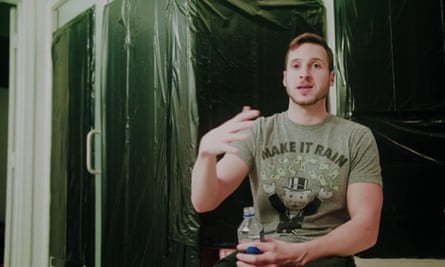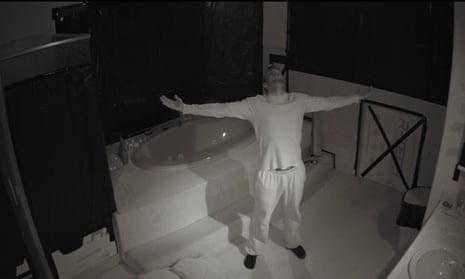Three – or was it four? – days after he shut himself in a pitch-black bathroom, Rich Alati started to hallucinate. He saw little white, bubble-like balls, floating around the room. To calm himself he imagined he was in a magical cloud, cozy and relaxed. Embracing the visions was key. “Or else,” he says, “you might get a little scared.”
Alati was in the dark for a bet, which makes a little more sense once you know he is a professional poker player. On 10 September last year, the American was sitting at a poker table at the Bellagio in Las Vegas, when he was asked a question by a fellow professional player, Rory Young: how much would it take for him to spend time in complete isolation, with no light, for 30 days? An hour later a price had been agreed: $100,000.
Young would hand over the money if Alati could last 30 days in a soundproofed bathroom with no light. He would be delivered food from a local restaurant, but the meals would come at irregular intervals to prevent him from keeping track of time. There would be no TV, radio, phone or access to the outside world but he would be allowed some comforts: a yoga mat, resistance band, massage ball, and, appropriately for a bathroom, lavender essential oils as well as a sugar and salt scrub. If Alati failed he would have to pay Young $100,000.
Poker players are known to bet on just about anything but some thought Alati had taken things too far. “I wouldn’t do this bet for any amount of money,” professional poker player Danielle Moon Anderson noted at the time. Dr Michael Munro, a psychologist Young consulted before agreeing to the bet, told Young: “Even if he lasts for 30 days, it will be extremely taxing on his mental health for the short and potentially long term.”
There’s good reason for such caution. Solitary confinement is often used as punishment, most notably in the United States, where inmates in solitary are isolated in their cells 23 hours a day. The United Nations’ Nelson Mandela Rules state that keeping someone in solitary for more than 15 days constitutes torture.
Dr Terry Kupers, a psychiatrist at the Wright Institute in Berkeley, says the bet risked trivializing solitary confinement. “Anxiety, anger and despair, often with a high risk of suicide, is the average clinical presentation of prisoners in solitary,” he says.
While there would be notable differences between Alati’s experiences and those of a prisoner in solitary – most notably, he could leave at any time – Young believed the American was unlikely to last the 30 days. “It’s just so cruel to the human mind to do that,” he says.
But Alati was confident. He had practiced meditation and yoga, and was certain his experiences at silent retreats would help him. On 21 November, a crowd of families and friends gathered at the house where the challenge would take place. Alati and Young’s lawyers were there as well as cameramen from a production company interested in buying television rights to the story. For that reason, as well as safety, the entire bet would be recorded. Alati’s father was given the power to pull Alati out at any time should he show signs of not being “in the right headspace,” as Alati puts it.
At 8.05pm, Alati walked into the bathroom, and darkness fell. He stood for a moment, frozen. Then he lay down and fell asleep.
The bathroom mirrors were covered to prevent any reflection, and the doors, though unlocked, were sealed to block out any light. A mattress was wedged between the sink and a countertop. In front of the sink and next to the mattress was Alati’s yoga mat. And across from that was the bathtub.
“My memory is really good,” Alati says. He had examined the room before the challenge started, and when he woke up in complete darkness, he could picture his surroundings. He told himself that he should do what he normally does when he wakes up, and began his routine.
He brushed his teeth. He then filled up the bathtub, adding Epsom salts and lavender oil to calm his mind, and scoured himself with the sugar and salt scrub. From the bath, he went to the shower in the corner of the room to rinse off. He then headed to the sink, where he used Q-tips on his ears, combed his hair, and lotioned his body. He got dressed and ate. He did yoga and meditated. “I was remembering where everything is, and everything goes back to that exact place,” Alati says. “That’s how I live my life anyways.”
And that was his plan. He was going to live his normal life as if normal “was living in darkness for the rest of my life.” He had 720 hours and absolutely no distractions – and he’d use that time to improve himself. “How can I give myself a better sugar scrub ... how can I stretch it deeper, how can I be more calm, how can I be more patient?” he says.
From the outside his life was, well, a little dull. Young, who had began watching the video stream in earnest, said “it became a bit boring after a while because it’s not like he’s doing anything different.”
The biggest hurdles were mental. As well as the hallucinations, his thoughts twice started to spiral negatively, fast. “It happened so quick. It went from positive thoughts to like what if, what if, what if?” Alati says. Such thoughts were dangerous without company to distract him. In isolation, they could lead to despair. When they cropped up, Alati started doing yoga, and he refocused on his body, on his pose and stretch.
Some parts were easier. With so much time and only himself for company, Alati’s thoughts were a source of entertainment and a lifeline. “The thoughts would just come to you, and if you don’t make sure that they go in a good direction, they can spiderweb out of control and lead you to a bad place,” Alati says.

Around the 10-day mark, Young started to worry that Alati might make the 30 days, noting he looked “totally fine”. He worried he had miscalculated: Young hadn’t known Alati – a gregarious, fast talker – for long before they had made the bet. “His personality did not reflect that of someone who was proficient with meditation,” Young said.
On day 15, Young’s voice came on over the loudspeaker. Alati jumped out of bed, happy to hear a voice that wasn’t his own. Young told Alati that he had been in for around two weeks and that he had an offer for him: Alati could leave if he paid out $50,000.
Alati’s laughed in disbelief. “You can’t be serious,” Alati recalls telling Young. “Dude, I just sat in here for two weeks, and you want me to hand over half my money?” He laid back down discouraged. He’d spent 15 long days in the bathroom – “no walk in the park” in his words – and he had to gear up for 15 more.
“It was a pretty aggressive negotiation tactic by me,” Young concedes. He waited a few days and came back with another offer. Alati was skeptical. “I don’t know, kid, your buyout offers are trash,” Alati recalls telling Young. Young offered to pay Alati $25,000 to come out. The money was finally in Alati’s favor. He considered the offer for an hour – and then declined.
Alati waited for a few days until Young came back on the loudspeaker and asked if he had any offers of his own. Alati said he wouldn’t come out for less than $75,000, to which Young countered with an offer of $40,000. They settled on $62,400. Alati had had been in the silence and dark for 20 days.
Young was relieved. He had come to a gradual realization that he hadn’t given enough weight to the fact that Alati was there by choice. “So if you’re in solitary confinement in prison, that’s a scary situation. You don’t know if you’re going to get out ever,” he said. “Here, if he lasts, he gets 100k, but these guys in solitary confinement get nothing – they have to do that.”
Kupers says that distinction – “remembering why he is there, that it is not permanent” – is crucial. “Prisoners in solitary confinement tell me they are afraid they will never be released and they will die in solitary.”
Alati, after his own taste of isolation, agrees. “[Prisoners in solitary] are not given a bathtub with sugar scrubs, and essential oil and food, and a yoga mat. They’re not given that stuff, so if I didn’t have that stuff, and I wasn’t actually free and I wasn’t being paid, that’s why [it would be a] punishment.”
Alati was ready to leave the bathroom. He put on eclipse sunglasses, which blocked out any light, to protect his eyes. When he finally emerged, the noise and commotion was overwhelming. He was handed a phone, and Alati looked at it for a moment, remembering that life existed with phones and technology, before he began speaking into it. It was his sister.
Friends and family surrounded him, and social interaction was “a bit of a culture shock”. He was surprised by the number of choices he had and that social niceties needed to be observed. “I knew how to do everything – I just forgot,” Alati says. “I can’t just start doing push-ups on a bathtub in front of people. I can’t just start walking around with no underwear.”
Despite paying out $62,400, Young is happy he took the bet. “I think it is a good story of when two people want to test whether they can do something, they do it in a fair environment and can work together, and even though one of us lost a sizable chunk of money, we both feel great about it.”
Alati says he is happy, too. He hopes his story serves as a positive for others about overcoming challenges in a world of bad news. He says he has learned to value patience and things we take for granted, like chairs, tables and lamps or simply being outside. “We truly go about our day to day and put up these blinders because there’s so much distraction, but if you just look at the world with a different perspective and just see it, this is something,” he says. “This is really something.”
